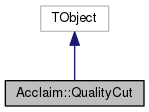 |
 |
Base class from which all my quality cuts inherit. More...
#include <QualityCut.h>
Public Member Functions | |
| virtual void | apply (const UsefulAnitaEvent *useful, AnitaEventSummary *sum=NULL)=0 |
Static Public Member Functions | |
| static Bool_t | applyAll (const UsefulAnitaEvent *usefulEvent, AnitaEventSummary *sum=NULL) |
| Applies all the event quality cuts in succession, this should be the primary interface. More... | |
| static Bool_t | passedAll (const AnitaEventSummary *sum, bool describe=false) |
| Reads the flags set in AnitaEventSummary, returns true if the event passed all quality cuts. More... | |
Public Attributes | |
| TString | description |
| Bool_t | eventPassesCut |
Base class from which all my quality cuts inherit.
Contains a description, boolian to indicate pass/fail and apply function which must be implemented in descendents Some of my filters use rolling averages so "bad events" could ruin them. Therefore apply() acts on a UsefulAnitaEvent rather than a FilteredAnitaEvent so that we can decide whether or not we want to exponse the a FilterStrategy with an internal state to a bad event.
Definition at line 34 of file QualityCut.h.


|
static |
Applies all the event quality cuts in succession, this should be the primary interface.
Each cut sets a different flag inside the AnitaEventSummary, however this function also sets the master flag "isGood" if the event passes all of the cuts.
| usefulEvent | is the event whose quality we which to check |
| sum | is the AnitaEventSummary, the isGood flag is set if the event passes all quality cuts |
Definition at line 45 of file QualityCut.cxx.
|
static |
Reads the flags set in AnitaEventSummary, returns true if the event passed all quality cuts.
| sum | points to the AnitaEventSummary to evalutate |
| describe | if true prints a message to stdout describing the reason the event failed a quality cut (default false) |
Definition at line 73 of file QualityCut.cxx.
 1.8.11
1.8.11